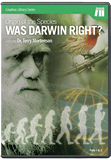Was Darwin Right?
Answering Evolutionist Professors in the UK
The fossil record falsifies the theory of evolution, but it confirms the teaching of Genesis 1.
The gradual change of fossil species has never been part of the evidence for evolution.
While on a speaking tour of nine cities in England and Scotland last year, organizers in one city sent invitations to hundreds of university professors in the area to attend one of my lectures on “Origin of Species: Was Darwin Right?” and to submit questions or objections. Only one hostile critic attended the meeting, accusing me of deception and questioning the validity of my PhD, but he would not reveal his name or profession. A university faculty member who is a Christian came with questions and said afterwards that he was helped by the lecture. A few university faculty or staff responded to the email invitation with an email reply.
I will only respond to two people—one in this article and the other in an article soon to follow—those who said something of substance worthy of a thoughtful response. Before I share my first response, I thought you would be interested in the replies of the other evolutionists (names and institutions have been withheld to protect the correspondents):
Please relay this on to Dr. Mortenson. Was Darwin right? Yes. Are the answers in Genesis? Not unless the question is “what is a bit like lord of the rings, only with less Orcs and realism.” With regards, The wrong tree to be barking up.
—Biology professorYour kidding, right?
—Position not givenYes, he was.
—Position not givenThere can be no doubt that Darwin and his contemporaries was [sic] right. Please do not send me any more of these emails.
—Biology professor
Now consider my response to one of the other two evolutionist academics who wrote to the organizers and have since received my reply.
In Search of a Predictable and Falsifiable Theory
A research associate for a university biology faculty wrote the following:
Hi - Why would you send me this? I like theories that make predictions and can be proven to be false. I hope you have a pleasant evening. But please remove me from your mailing list.
My reply, slightly adapted, was as follows:
We did have a pleasant evening, thank you. It would have been more pleasant if you had come and in a civil academically respectable manner raised objections to one or more points that I made in my lecture so we could discuss the matter further.
You say that you are only interested in theories that make predictions and can be potentially falsified. Well, creation fits the bill and succeeds, whereas evolution fits the bill, but fails. Consider, as only one example, the predictions of the two views of origins regarding fossils.
Darwin spent an incredible amount of time in his 1859 book Origin of Species discussing the problems of his theory, paramount of which was the fossil record. Darwin predicted that one day the fossil record would supply the evidence to confirm his theory that all plants and animals and man are descended from one common ancestor. In contrast, it is clear from Genesis that God created different kinds of plants and animals and mankind to reproduce after their kind but not to change into a different kind.
Today the fossil record even more clearly demonstrates that Darwin’s theory (and the modern Neo-Darwinian theory) is false and that the Genesis account of creation is true.
Consider the testimony of experts on the fossil record from three of the most prestigious universities, all of whom are evolutionists. David Raup, the famous paleontology professor at the University of Chicago, said,
Well, we are now about 120 years after Darwin and the knowledge of the fossil record has been greatly expanded. We now have a quarter of a million fossil species but the situation hasn’t changed much. The record of evolution is still surprisingly jerky and, ironically, we have even fewer examples of evolutionary transition than we had in Darwin’s time. By this I mean that some of the classic cases of Darwinian change in the fossil record, such as the evolution of the horse in North America, have had to be discarded or modified as a result of more detailed information—what appeared to be a nice simple progression when relatively few data were available now appears to be much more complex and much less gradualistic. So Darwin’s problem has not been alleviated in the last 120 years and we still have a record which does show change but one that can hardly be looked upon as the most reasonable consequence of natural selection.1
Stephen Jay Gould, the late Harvard University geologist and paleontologist, rejected gradualistic evolution in favor of his evolutionary theory of “punctuated equilibrium” because,
The extreme rarity of transitional forms in the fossil record persists as the trade secret of paleontology. The evolutionary trees that adorn our textbooks have data only at the tips and nodes of their branches; the rest is inference, however reasonable, not the evidence of fossils.2
The situation is no better for the evolutionists today than it was in the late 1970s. Dr. Duane Gish documented this in his 1995 book Evolution: The Fossils Still Say No! (which was the third expanded and updated version of his 1972 book on the same subject). More recently, from interviews with evolutionist paleontologists at leading museums all over the world and using beautiful photographs of fossils in those museums, Dr. Carl Werner has documented this same fact: there is no fossil evidence that one kind of creature has ever changed into a different kind—they have only produced variation within each kind. See Werner’s Evolution the Grand Experiment (2007) and Living Fossils (2009). Both of Werner’s books and associated DVDs can be found in our online store.
We shouldn’t be surprised by this lack of evidence for evolution. In fact, thirty years ago Mark Ridley, evolutionist zoology professor at Oxford University, informed us:
The gradual change of fossil species has never been part of the evidence for evolution. In the chapters on the fossil record in the Origin of Species Darwin showed that the record was useless for testing between evolution and special creation because it has great gaps in it. The same argument still applies. . . . In any case, no real evolutionist, whether gradualist or punctuationist, uses the fossil record as evidence in favor of the theory of evolution as opposed to special creation.3
So the fossil record falsifies the theory of evolution. But it confirms the teaching of Genesis 1—that God created different kinds of plants and animals and mankind with the ability to produce enormous variety within each kind, but not the ability to change one kind of creature into a different kind (e.g., a fish into an amphibian, a reptile into a bird or mammal, a dog into a horse or cat, or an ape into a man). In fact, in the article above, Gould says that there are two characteristics of the fossil record: abrupt appearance and stasis. That is, the first time a creature appears in the lowest rock layer it is fully formed and fully recognizable. As we come up through the rock layers we see variation within each kind of creature but they remain the same kind of creature (i.e., they may have longer or shorter legs than predecessors, or longer or shorter snouts, etc., but no new and different body parts). But “abrupt appearance and stasis” is just another way of saying “creation after their kind,” as Genesis 1 teaches.
Darwin was really only destroying a straw-man when he showed that species change, because Bible-believers in his day and creation scientists today had/have good scientific evidence that a created “kind” in Genesis 1 is not the same as the modern taxonomic classification of “species” but rather is equivalent to “genus” or more often “family.” So, creationists don’t believe in the “fixity of the species”: Darwin refuted a view that was not held by informed Bible-believers. While he showed that species change, he did not show that (much less how) all plants and animals and man are descended from a common ancestor. And no evolutionist since him has presented credible evidence (that can stand up to careful scrutiny by well-informed critics) to show that it happened, as Gish and Werner’s work above demonstrates.
The Answers in Genesis web site discusses many other specific examples of claimed “missing link” fossils, such as Tiktaalik (which supposedly is the transitional creature between sea creatures and the first land animal). Furthermore, neither natural selection (which only selects from existing genetic information) nor mutations (which only shuffle, duplicate, or destroy existing genetic information) can account for the new genetic information required to change a bacterium into a fish, or a fish into an amphibian, or a reptile into a bird or mammal, or an ape into a man, or even a non-finch into a finch, etc. Stephen Jay Gould himself was skeptical of the role that natural selection plays in the evolutionary process.4
Evolution appears proven to most scientists and non-scientists because it is the only view allowed in schools, universities, science journals, TV science programs, and science museums. Evolutionary ideas survive because they are protected from criticism.
I respectfully challenge you to investigate this issue more carefully.
Sincerely,
Terry
Further Reading
Footnotes
- David M. Raup, “Conflicts Between Darwin and Paleontology,” Field Museum of Natural History Bulletin 50, no. 1 (Jan 1979): 25.
- Stephen J. Gould, “Evolution's Erratic Pace,” Natural History 86, no. 5 (May 1977): 14.
- Mark Ridley, “Who doubts evolution?”, New Scientist 90 (25 June 1981): 830–831 (italics in the original).
- Stephen Jay Gould, “Is a new and general theory of evolution emerging?” Paleobiology 6, no. 1 (1980): 119–130.
Recommended Resources

Answers in Genesis is an apologetics ministry, dedicated to helping Christians defend their faith and proclaim the good news of Jesus Christ.
- Customer Service 800.778.3390
- © 2024 Answers in Genesis









